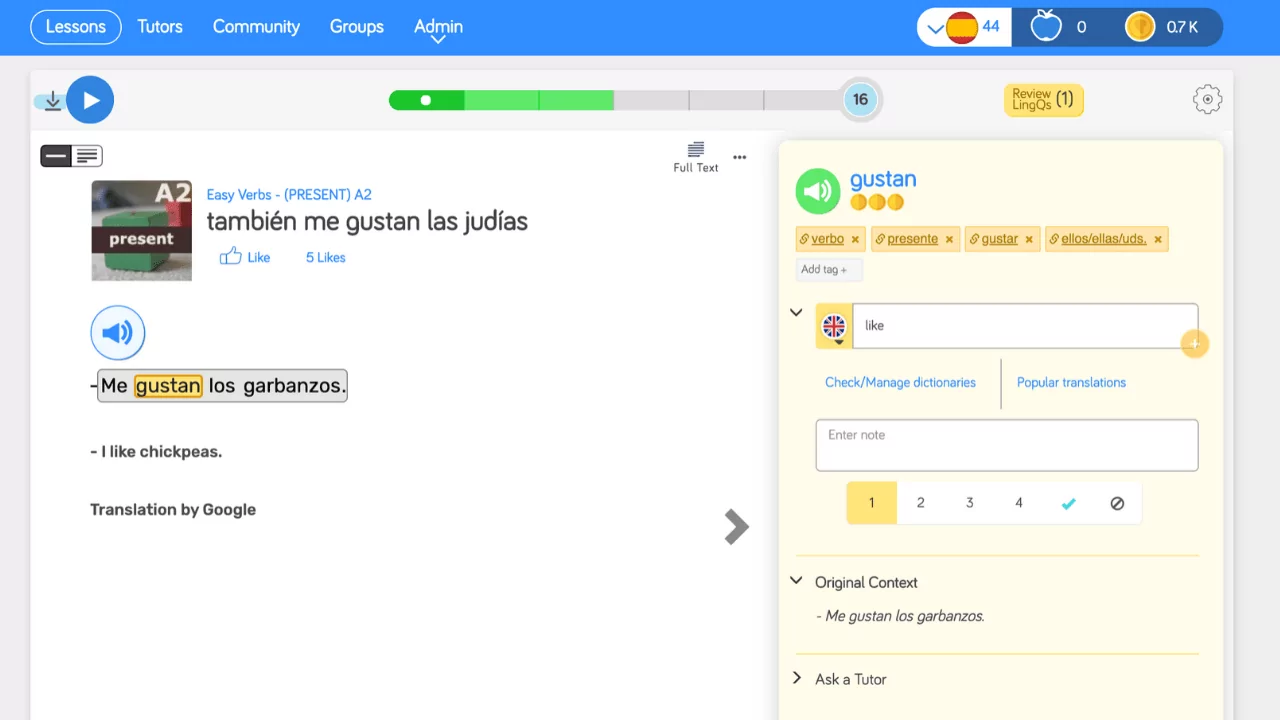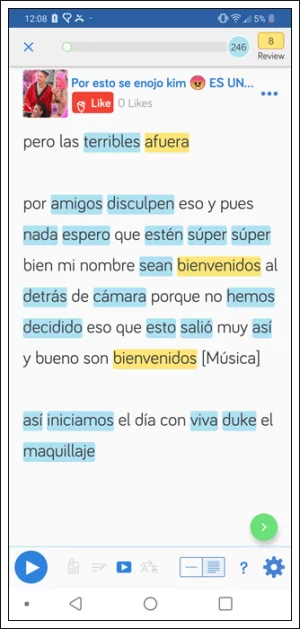Verbs Like Gustar: Saying You Like Something in Spanish
When studying Spanish, one of the first things we learn is talking about what we like (gustar) and dislike (no gustar). It’s easy to learn the expression ‘me gusta el perro’ (I like the dog), but you might notice something odd about the sentence. Normally when ‘I’ is the subject of the sentence, we see the verb end in the letter ‘o.’
Yo comprendo ‘I understand’
Yo leo el libro ‘I read the book’
So what’s going on here?
The Spanish Verb Gustar
The verb gustar is used a bit differently than you might might expect. Let’s take an example.
Me gusta tu perro ‘I like your dog’
Unlike in English, the things we like are the subject of the sentence. At the same time the person who likes is the indirect object. So, when we literally translate the sentence with gustar, we end up with a strange phrase like ‘your dog is pleasing to me’
me gusta tu perro
to-me is-pleasing your dog

This is how the verb gustar works in Spanish. The person who likes something will come at the beginning of the sentence as the indirect object. After that will come the conjugated verb gustar.
Me gusta X ‘I like X’
Te gusta X ‘You like X’
Le gusta X ‘S/he likes X’
Nos gusta X ‘We like X’
Les gusta X ‘They like X’
The third person singular pronoun le is a bit tricky though. By itself, you can know whether the person is a she or he. Furthermore the pronoun le can also refer to usted, the more polite/formal form of tú.
In order to avoid confusion, sentences with le gusta(n) will often add a prepositional phrase at the beginning of the sentence. This will include the preposition ‘a’ and the person who likes the object.
A + person + le gusta + thing
A Maria le gusta este libro ‘Maria likes this book’
A Jorge le gusta este libro ‘Jorge likes this book’
A ella le gusta este libro ‘She likes this book’
A él le gusta este libro ‘He likes this book’
A la chica le gusta este libro ‘The girl likes this book’
It’s important to remember that the verb gustar changes according to number of what’s being liked. As such, you have to use gusta for one object and gustan for multiple.
Nos gusta esa secadora ‘We like that dryer’
Nos gustan esas secadoras ‘We like those dryers’
Additionally the verb gustar also changes for tense.
Me gustaban esas películas ‘I used to like those movies’
Te gustará su idea ‘You’ll like her idea’
Les gustó ‘They liked it’
Negating the Verb Gustar
Negating the verb gustar and saying that you don’t like something is straight forward. You only need to add the negative particle before the indirect object. If there is a prepositional clause with ‘a’ then ‘no’ will come after it.
No me gusta su nueva cocina ‘I don’t like his new kitchen’
A la gata no le gustan las sirenas ‘The cat doesn’t like the sirens’
Learn Spanish Verbs the Fun Way With LingQ
There is so much great content in the Spanish library at LingQ. You can learn from YouTube videos, Netflix shows, podcast episodes, blog posts, news articles, whatever you’re interested in.
If you’re looking specifically for lessons that will help you to learn gustar and verbs like it, the Easy Verbs Course is a great place to start. Work your way through the different course from beginner 1 all the way to advanced 2 and master the Spanish verbs!

Spanish Verbs Like Gustar
The verb gustar isn’t the only verb that works this way. There are actually a whole slew of verbs that behave just like gustar, with the person as an indirect object. We can’t go over all of them, so we’ll give you a list of some of the most common and the most useful Spanish verbs like gustar.
Aburrir ‘to bore’
Encantar ‘to be really pleasing/to love’
Importar ‘to be important/to matter’
Faltar ‘to miss/to lack’
Fascinar ‘to fascinate’
Parecer ‘to seem/to appear’
Pasar ‘to happen’
Preocupar ‘to worry/to bother’
Quedar ‘to remain’
Some of these translate easily into similar English structures, like aburrir (to bore/to be boring for someone) or parecer (to seem to someone). Others are more difficult to understand, like quedar (to remain/to be left to someone) and faltar (to be missing/to be lacking to someone).
All of the verbs take the same indirect objects as the verb gustar. Likewise, they all conjugate to agree with the subject and conjugate for tense.
Indirect object + verb
Me encanta esta canción ‘I adore/really like this song’
Me importa la verdad ‘The truth is important to me’
A mi amiga le falta motivación ‘my friend lacks motivation’
Esta solución nos parece positiva ‘This solution seems positive to us’
Qué te pasa? ‘What’s going on with you’
Te preocupan los resultados ‘You’re worried about the results’
Le queda su ordenador ‘He still has his computer’

Grammar for Verbs Like Gustar
The Grammar for these verbs works the same way that it does for the verb gustar. As such, the negative particle no comes before the indirect object and verbs can conjugate according to tense. Likewise, all the verbs like gustar also conjugate according to number.
Me encantaba esta canción ‘I used to adore/really like this song’
No Me importa la verdad ‘The truth doesn’t matter to me’
A mi amiga le faltó motivación ‘my friend lacked motivation’
Qué te pasó? ‘What happened to you’
Te preocuparán los resultados ‘You’ll be worried about the results’
Le quedaba su ordenador ‘He still had his computer’
Learn Spanish Faster Using LingQ
Immersing yourself in Spanish doesn’t require you to travel abroad or sign up for an expensive language program. However, it can be a bit tiresome to find interesting content, go back and forth between sites, use different dictionaries to look up words, and so on.
That’s why there’s LingQ, the best way of learning Spanish online because it lets you learn from content you enjoy!

Keep all your favourite Spanish content stored in one place, easily look up new words, save vocabulary, and review. Check out our guide to importing content into LingQ for more information.
LingQ is available for desktop as well as Android and iOS. Gain access to thousands of hours of audio and transcripts and begin your journey to fluency today.
People often wonder how long it takes to learn a language. How long to learn Spanish? Check out polyglot and LingQ cofounder Steve Kaufmann’s blog post to find out!
***
John Melnyk is a freelance writer and translator from Florida, USA living in the Netherlands. He has a masters degree in linguistics and communication and is currently working on his first novel.


